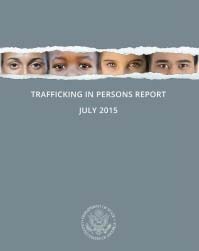Posts Tagged ‘Human Trafficking’ (68 found)
APRRN Statement on Protection at Sea
With the imminent commencement of the ‘sailing season’, more refugees and migrants are expected to depart on perilous journeys from Myanmar and Bangladesh to Thailand, Malaysia, and Indonesia. Over the past few years, the world has witnessed the suffering and violence that people on these journeys have endured at the hands of smugglers and traffickers […]
• • •US: Don’t Let Trade Trump Human Rights
(Bangkok, July 28, 2015)—The U.S. State Department’s annual Trafficking in Persons (TIP) report fails to accurately assess Malaysia and Myanmar’s efforts to combat human trafficking, Fortify Rights said today. U.S. Secretary of State John Kerry released the report in Washington, D.C. on Monday, upgrading Malaysia from Tier-3 to Tier-2 Watch-List status and keeping Myanmar at Tier-2 Watch-List status, despite evidence that each country failed to adequately combat human trafficking in 2014 […]
• • •Trafficking in Persons Report 2015
BURMA: Tier 2 Watch List
Burma is a source country for men, women, and children subjected to forced labor and for women and children subjected to sex trafficking. Some Burmese men, women, and children who migrate for work abroad—particularly to Thailand and China, as well as ther countries in Asia, the Middle East, and the United States—are subjected to forced labor or sex trafficking. Men are subjected to forced labor in the fishing, manufacturing, forestry, and construction industries abroad, while women and girls are primarily subjected to sex trafficking, domestic servitude, or forced labor in garment manufacturing. NGOs report an increase in the number of Burmese males transiting Thailand en route to Indonesia and Malaysia, where they are subsequently subjected to forced labor, primarily in the fishing industry. Some Burmese men in the Thai fishing industry are subjected to debt bondage, passport confiscation, or fraudulent recruitment; some are also subjected to physical abuse and forced to remain aboard vessels in international waters for years. Reports indicate some Rohingya asylum seekers transiting Thailand en route to Malaysia are sold into forced labor on Thai fishing boats, reportedly with the assistance of Thai civilian and military officials. Burmese women are transported to China and subjected to sex trafficking and domestic servitude through forced marriages to Chinese men; Burmese government officials are reportedly occasionally complicit in this form of trafficking […]
• • •UN Resolution – Human Rights Situation of Muslims in Myanmar
Condemns the systematic gross violations of human rights and abuses committed in Rakhine State, in particular against Rohingya Muslims […]
• • •Parliamentarians Call on Asean Ministers to Address Root Causes of Migrant Crisis at Kl Meeting
JAKARTA, 1 July 2015 – ASEAN home ministers meeting in Kuala Lumpur tomorrow must take firm action to combat human trafficking, protect vulnerable asylum seekers, and address the root causes of the continuing migrant crisis, including the persecution of Rohingya in Myanmar, ASEAN Parliamentarians for Human Rights (APHR) said today […]
• • •Burma 2014 Human Rights Report
Burma’s parliamentary government is headed by President Thein Sein. In 2012 the country held largely transparent and inclusive by-elections in which the opposition National League for Democracy (NLD) party, chaired by Aung San Suu Kyi, won 43 of 45 contested seats of a total 664 seats in the legislature. Constitutional provisions grant one-quarter of all national and one-third of all regional and state parliamentary seats to active-duty military appointees and provide that the military indefinitely assume power over all branches of the government should the president declare a national state of emergency. The ruling Union Solidarity and Development Party (USDP) continued to hold an overwhelming majority of the seats in the national parliament and state and regional assemblies, and active-duty military officers continued to wield authority at many levels of government. There is no civilian control of the military; police forces also report to the military through the minister of home affairs […]
• • •Launch of Suaram Human Rights Report 2014: Six Worrying Trends Under Najib’s Administration
SUARAM is pleased to launch its 2014 Human Rights Report of Malaysia today. Since its first launch in 1998, SUARAM has without fail published an annual human rights report which offer comprehensive documentation and analysis of the human rights landscape, a report that is much awaited by local civil society and international human rights organisations […]
• • •The Intersection of HADR and the Rohingya Refugee Crisis
Now that Indonesia and Malaysia have agreed to provide temporary refuge for Rohingya refugees, the recent humanitarian crisis is moving toward a longer term relief and resettlement operation. But the sequence of events leading up to the short-term relief operation demonstrated serious limitations in how regional actors respond to politically sensitive humanitarian challenges. The actions and words of Burma and the other ASEAN countries, as well as those of the United States, are important indicators of the current state of multilateral organizations, international law, and the support of human dignity. Most notably, the Rohingya refugee crisis should be used to shift the debate on the future of Humanitarian Assistance and Disaster Relief (HADR) exercises between the United States and its allies […]
• • •Encouraging AICHR to Address the Urgent Issue of Irregular Migration Crisis in Asean
Jakarta, 17 June 2015. The Representative of Indonesia to the ASEAN Intergovernmental Commission on Human Rights (AICHR), Rafendi Djamin, encouraged the AICHR as the overarching Human Rights institution in ASEAN to discuss and address the humanitarian and human rights crisis – migration flow and seafaring refugees – which has become increasingly prevalent in ASEAN […]
• • •International Investigation Needed into Human Rights Violations Against Burma’s Rohingya
Monday 8th June marks the third anniversary of a new wave of large-scale violence against Burma’s Rohingya ethnic minority. The violence left hundreds dead and displaced more than 140,000 people […]
• • •









 All posts
All posts